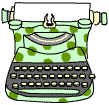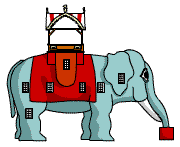To Whom It May Concern
Created | Updated Jan 22, 2003

January 23rd, 2003
Dear Sir or Madam,
There has been entirely too much fun made of the way Canadians supposedly say 'eh' all the time. As a Canadian myself eh, I am among the least likely to be bothered by anyone having fun, as long as it's good clean fun. But lately the laughter sounds more like ridicule. It even has an almost dangerous and hostile undertone.
Y'know, that same nasty gleeful tone you hear when a group decides to mock and threaten someone or something that is different, unwanted and considered disposable. Y'know, that terrorising joyfulness you hear in lynch mobs, gay-bashers, football hooligans and US fighter pilots.
No, I probably shouldn't be bothered, eh. But I am, so I will point out that 'eh' is a grammatical formation known officially as a 'narrative marker' and it is not unique to Canadians! This fact may take the fun out of it for some, but a few, like the more socially responsible and linguistically curious, will find that the truth (as always) is really quite revealing.
A narrative marker is like an interjection and performs the function of allowing the speaker a 'break' in which to assess the reaction of the listener, to determine if what has been said thus far is actually being understood or fully appreciated. You're with me so far, eh. Okay, here's the Truth of it.
The English narrative marker is 'wot' or even 'ey wot' - (the 'ey' being the ancient spelling of 'eh'). There was a time when Brits used to pepper their speech with 'wot's and 'ey wot's and I could get a laff from my fellow Canadians just by saying, "Wot, wot, wot!" in a pompous voice while raising my nose and rocking back on my heels.
Recently, perhaps because they've seen the way Canucks are being persecuted for 'eh', Brits tend to use 'wot' only at the end of a mildly declarative sentence such as, "Oh I say, that must hurt, wot!" or "Look at the Ph double Ds on that one, wot!"
The Germans constantly use 'ja' as a narrative marker. "I was going to the tavern, ja, for the drinking of some beers. You are kommen wit, ja?". It is usually a hearty and encouraging use of the word 'yes' as a positive narrative marker. The Russians use a similar word, 'da', in much the same way when seeking affirmation, confirmation or a drinking partner.
The French have two negative narrative markers, 'non' and 'n'est-ce pas', which can be inserted into any statement to indicate the speakers continued interest in positive feedback from the listener. "Zis is the place, non?" or "In Canada you have the strong beers, n'est-ce pas?". This politely diplomatic formation allows the listener the negative option but still inists a continued dialogue.
Even the mighty Americans have a residual narrative marker to indicate a speaker's interest in the opinion or reaction of others. While in the main, Yankees may think they no longer need to seek approval or show any concern for how their words are being received, they do still say things like, "Sure is hot, huh?" or "Sure is cold, huh?". It can also be used at the beginning of a sentence to indicate a mild or feigned surprise, "Huh, y'only got 18 flavours!" or "Huh, you call this deluxe?" or used more defiantly at the end of a sentence such as, "You think that was funny, huh?"
It is true that Canadians may use 'eh' several times in a long narrative."I was going to the liquor store, eh, and this guy comes up to me, eh, and he says, 'eh, you going to the liquor store' and I'm like 'yeah', eh, and he says 'cool, can ya get me some, eh' and I says, 'you're too young, eh', and he says, 'Screw you, eh' and I'm like, 'Grow up, eh' and I go on my way. Kids today, eh?"
So when you hear a Canadian saying, "Nice day, eh?" don't laugh and don't mock. Just remind yourself that the same formation is used in most languages to invite consent, seek approval or permit the expression of ammendment or objection from the listener. The American says "Nice day, huh?", the Frenchman says, "C'est bon, n'est-ce pas?", and the German says, "Ze Beer ist gut, ja?"
And if a Canadian ever says to you something like, "Eh, what was that?" or "Eh, say again please. Sorry, I didn't hear you, eh", please, remember that a Brit might only have grunted, "You wot?"
Hoping you will give some consideration to these thoughts,
I remain your most loyal and least dutiful savant,
peace,
~jwf~
To Whom It May Concern
Archive


